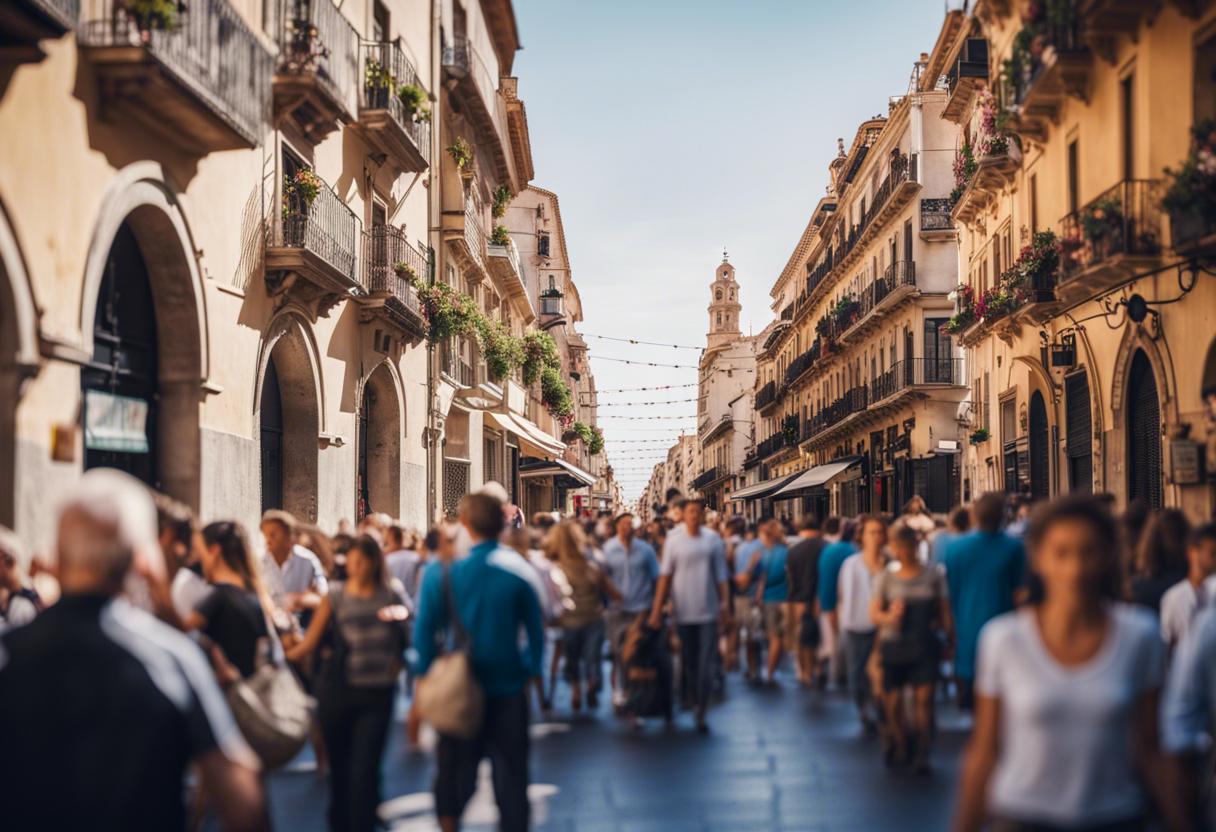“‘Tourism destroys the city. Tourists, return to your homes. You are not wanted here.” This scrawl, etched in scarlet on the face of a central Barcelona side street, needs little translation. Notably, this stance isn’t limited to a lone graffiti artist in Barcelona.
Early July witnessed a sea of local citizens flooding the streets of the Catalan city, expressing their dissatisfaction towards the growing influx of tourists disrupting their day-to-day lives. Some of the more passionate protestors sprayed bystanders from foreign lands, who were harmlessly seated in cafes, with water pistols.
Contrastingly, this is far from the greeting envisioned by Spain’s tourism department. They intended to draw overseas tourists back to the nation post-pandemic with their effective ‘You deserve Spain’ campaign. Astonishingly, this concept seemed to hit the nail right on the head, with tourist numbers in Spain even surpassing those of 2019. A whopping 85 million people visited the country last year, with the majority hailing from the UK, France, Germany and a notable 2.5 million from Ireland. Predictions for the current year propose an astonishing 90 million projected visitors, placing Spain a hair’s breadth behind France, the globe’s leading international tourist hotspot.
Nonetheless, as displayed by the hostile graffiti in Barcelona, this relentless surge in Spain’s tourism industry is now facing opposition. Cities much favoured by tourists, such as Málaga and Alicante, and even the Balearic and Canary Islands have experienced an eruption of protests this summer. A band of activists in Tenerife staged a staggering three-week fast in protest against proposed grand-scale tourism projects.
Grievances have not come out of the blue. Already back in 2016, a bold group of demonstrators obstructed traffic in downtown Barcelona, aiming to bring the city’s flawed tourism model to light. This year seems a tipping point, however, as a mounting number of Spaniards are weighing up whether benefits to the economy from tourism justify the associated grievances.
Barcelona, which became vibrant following the ’92 Olympics, has merged the allure of a bustling industrial hub with Antoni Gaudí’s architectures and a fortunate geographical location at the Mediterranean. Yet, in the past two decades, the town’s spirit has been undermined by cheap flights, bachelor parties, cruise ships, and more recently, Airbnb. Central Barcelona has evolved into a tourist-oriented consumerist hub, where global garment outlets, trinket stalls and large franchise coffee eateries and restaurants have overtaken small family enterprises. The city welcomed 3.5 million travellers via cruise ships last year, who spent merely a few hours, enough to exacerbate crowd numbers but inadequate to discover beyond the unsophisticated facade.
This trend has been mirrored in many other cities, such as Málaga on the southern coastline.Local activist Kike España likens the city to an amusement park, built for tourists yet neglecting the locals. Such criticisms have become routine in Spanish tourist destinations, referring to gentrification, street crowding, traffic and long queues which have made life for residents unpleasant due to the high visitor numbers.
The housing dilemma,however, receives the highest criticism. Barcelona, Málaga, and Palma de Mallorca are among cities witnessing rocketing rental prices as they’ve capitulated to tourism. Airbnb is often held accountable; landlords can earn more by renting their properties for short holiday stays as opposed to long-term residents.
In several regions, this housing issue has escalated to crisis levels. In Ibiza, due to the high rental prices, many workers commute from neighbouring islands. Professionals like junior police officers even resort to sleeping in their vehicles. Meanwhile, in Tenerife, activist Víctor Martín revealed that many tourism industry workers in the Canary Islands are dwelling in shanty towns.
Spain isn’t the only country dealing with this issue. Other European cities like Venice, Lisbon, Prague and Paris are witnessing locals increasingly voicing the negative consequences of tourism, especially on the real estate market.
The recent surge in protests in Spain has triggered local politicians to take the issue seriously, looking for strategies to slow the spread.
Both Catalonia and the Balearic Islands already impose a marginal “tourist tax” per overnight stay by tourists, mainly contributing to local revenue rather than effectively controlling visitor numbers. Cities such as Barcelona, Palma de Mallorca and Venice have capped the intake of cruise ships, the latter even prohibiting people from stopping on its congested bridges in an effort to control overcrowding. The enacted restrictions have not made a significant dent in tourist volumes.
To address housing issues, propositions have been made to either restrict or totally remove short-term vacation accommodations. The method for implementing this is being decided by individual city councils in Spain. Barcelona’s Socialist mayor, Jaume Collboni, has committed to rescinding around 10,000 licences for property rentals on Airbnb and other similar platforms by 2028.
Unregulated vacation rentals pose yet another problem as local governments lack the necessary manpower to effectively monitor this sector and hold unscrupulous operators to account.
Most Spaniards do not have a problem with tourism in general, acknowledging its vital role in their country’s economic growth. However, activists, industry insiders, and politicians concur on the need to reevaluate the kind of offerings presented to tourists, focusing less on low-cost, alcohol-centric holidays and more on tourism grounded in cultural or culinary experiences. Despite inevitable allegations of elitism, this strategy could help in decreasing visitor numbers and the effects they pose.
As Spain, along with other European countries hurry to restore the delicate dynamic between satisfying both locals and tourists, the challenge arises whether the unleashed surge of mass tourism can be effectively regulated.

